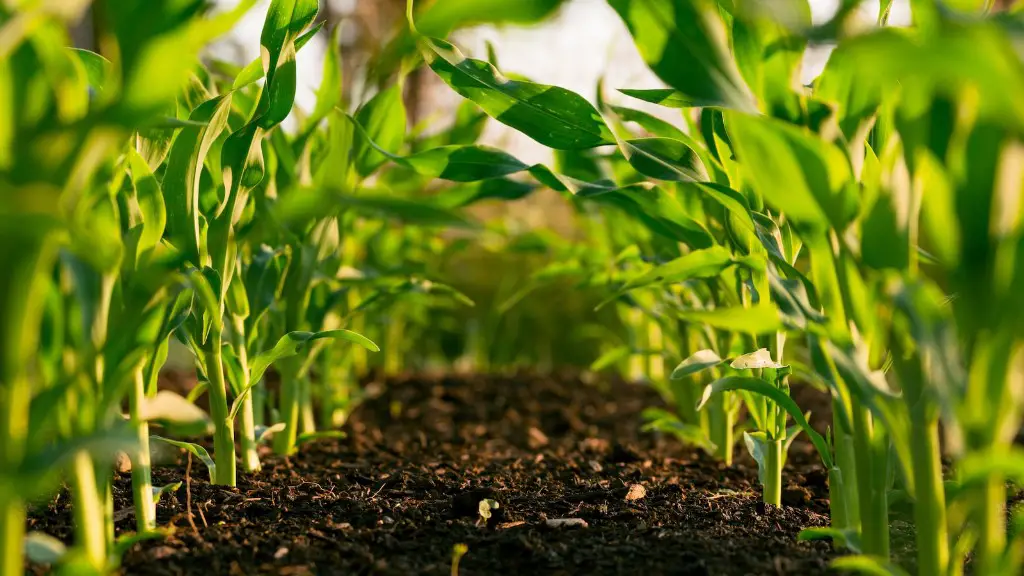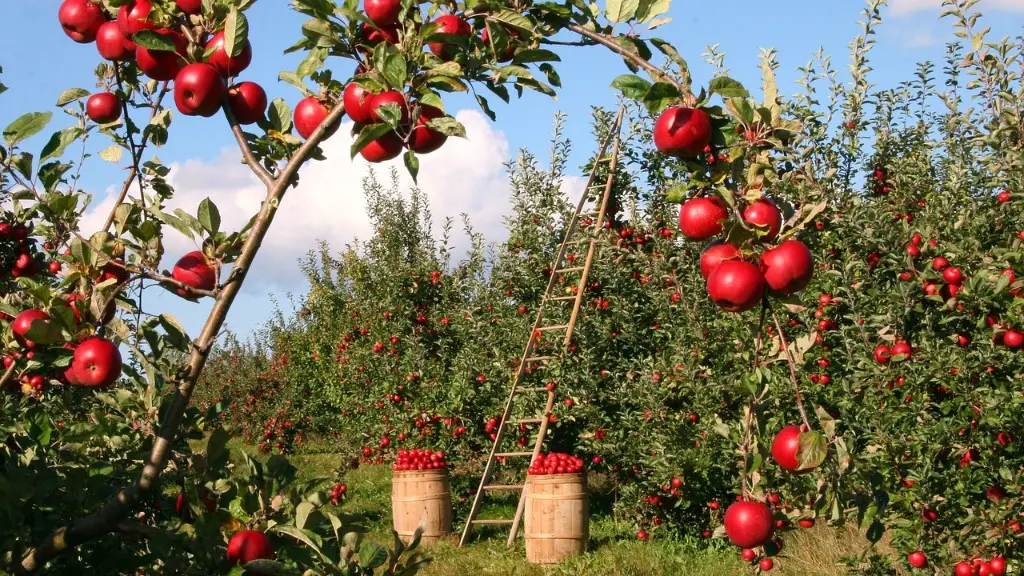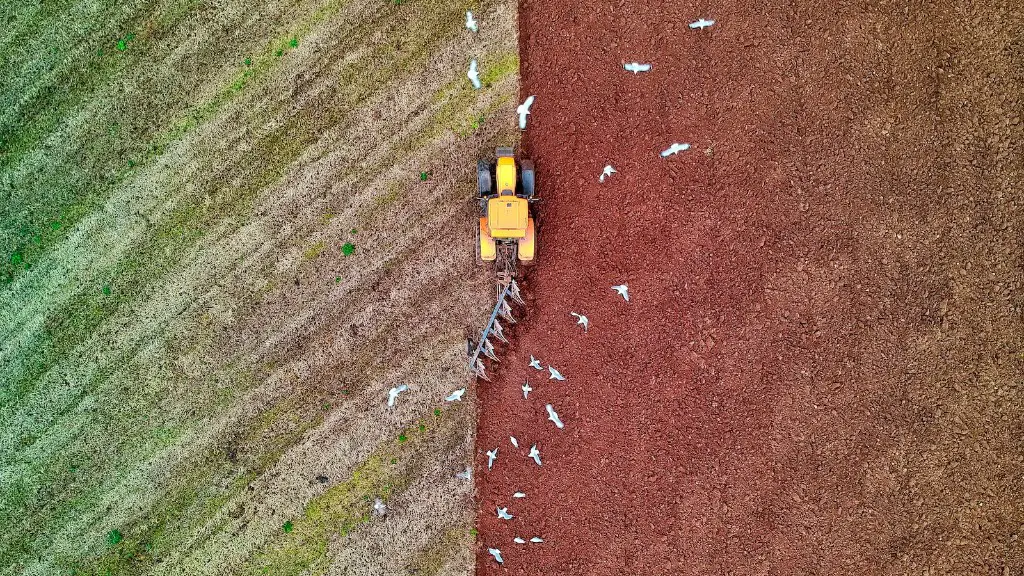Agriculture is an essential field in human society, providing us with the capacity to produce and supply food, clothing, biofuel, and a wide range of other goods that are necessary for human life. But what, exactly, is considered to be ‘agriculture’? Agriculture encompasses the study, the practice, and the science of cultivating the soil, producing crops, and rearing livestock and other animals. It involves the application of seasonal cycles, biological and physical processes, and various tools and techniques, all with the aim of creating a sustainable and efficient food-producing environment.
Agriculture involves various forms of manipulation of the soil and the environment, such as selection of varieties, planting and harvesting, soil fertility, pest control, and much more. It is a continuous process of learning and adapting to environmental conditions. By studying and understanding the effects of weather, soil conditions, crop varieties and other factors on the growth of crops, farmers can choose the best approach to maximize their production. Agriculture also involves the application of animal sciences, such as breeding, nutrition, health and welfare, animal management, and veterinary services.
Agriculture is a complex system that relies on many interrelated elements, such as soil fertility, water resources, plant genetics, crop management and production practices, animal nutrition and health, public health and regulatory frameworks. Agriculture covers a wide range of topics, from soil science and crop production to animal husbandry and environmental management. It also includes economics, marketing, and business administration. Additionally, modern agriculture involves the use of sophisticated technologies, such as precision agriculture, which seeks to maximize efficiency while minimizing the impacts of errors in farming practices.
Agricultural science is an important field of study, as it investigates and tests the theories and practices of traditional farming. It draws on a wide range of disciplines, such as genetics, biochemistry, climatology, meteorology, soil science, and entomology. In addition to its research and testing, agricultural science also focuses on the transfer of knowledge to improve production systems, land use, and resource management.
Agriculture is an ever-evolving field, which keeps current with the latest developments in science and technology, such as advances in robotics, genetics, climate-smart crops, renewable energy, and precision agriculture. As the field progresses, agricultural practices are improved to meet the needs of humans and the environment, while also providing safe and nutritious foods, making agriculture an important and fascinating field of study.
History of Agriculture
Agriculture is one of the oldest professions in the world. Over the centuries, farmers have developed and refined a range of techniques and technologies to help them feed and clothe their families, maintain their land and ensure their prosperity. The transition from hunter-gatherer societies to agricultural ones is one of the most fundamental changes in all of human history, and it has had a profound impact on all aspects of society.
The development of agriculture has been a long and complex process, but its effects are far-reaching. It has led to the emergence of large-scale civilizations, increased population growth, and a greater abundance of food. Scientists believe that the development of agriculture was necessary to provide enough resources to support cities and complex societies.
Agriculture has a long history, stretching back centuries before the invention of written language. Ancient farming cultures have left a lasting legacy, through the introduction of new crops, the domestication of animals, and the development of sophisticated irrigation systems. Through the centuries, farmers have continued to develop and refine their techniques, such as the use of new technologies, organic and biodynamic methods, and improved breeds.
Today, advances in science and technology have transformed the way we approach agriculture, and we are now able to produce more food than ever before. However, despite these advances, there is still a need for sustainable, ethical and healthy agricultural practices which will ensure an abundance of food for future generations.
Organic Agriculture
Organic agriculture is a form of farming that seeks to provide a healthy and sustainable environment for both humans and the environment. Organic farmers use natural pest and weed controls, instead of chemicals, to reduce the environmental impact of their farming operations. Organic farming practices rely on composting, mulching, crop rotation, and biological insect and disease control to keep pests and weeds in check. Organic farmers also strive to conserve water and minimize soil erosion, improve soil fertility and biodiversity, and reduce pollution.
Organic agriculture uses fewer resources and results in fewer emissions, making it a popular choice among eco-friendly consumers. Organic farming is also beneficial to local economies, as it increases the demand for fresh produce and jobs in the agricultural sector. It also makes a significant contribution to food security, since organic farming is less vulnerable to climatic variation and reduces our reliance on external inputs.
Organic agriculture is not without its challenges, however. Organic farmers often struggle with access to markets, as they are unable to compete with the lower prices of conventional produce. Additionally, organic certification can be difficult and expensive, and it requires the adoption of costly and difficult-to-implement standards. Despite these challenges, organic agriculture is growing in popularity, as more and more people become aware of its benefits.
Agricultural Economics
Agricultural economics is a field of study that focuses on the economic aspects of farming, including the production, marketing, and consumption of agricultural goods. A typical course of study will cover topics such as farming methods, soil and water resource management, economic analysis, consumer preferences, and policymaking. Agricultural economics contributes to both the domestic and global economy, as it helps to shape and develop agricultural policies, pricing strategies, and marketing strategies.
The demand for agricultural products is largely determined by consumer preferences and the competitive market, which can be affected by a range of factors, such as the weather, global economic conditions, the availability of land, labor, and technology. In addition, the price of agricultural products is affected by the costs of processing, packaging, and transporting them, as well as the costs of input (e.g. fertilizers, pesticides, etc.) and labor.
In order to maximize profits, farmers must balance these competing demands by making strategic decisions. Farm management techniques, such as diversification, specialization, and risk management, are critical in helping farmers reach their goals. By considering the economic, social, and environmental aspects of agriculture, farmers can ensure that their production is profitable, sustainable, and beneficial to their communities.
Agricultural Technology
Agricultural technology is an effective way to increase yields and efficiency in agricultural practices. It is an ever-evolving field, with new developments being made each year. These technologies range from sophisticated precision machinery and equipment, to information and communication technology, such as drones and satellite imaging. Agricultural technology can help farmers improve the production and management of their farms, as well as reduce the risk of crop failure and animal health issues.
The introduction of automated machines and sensors can reduce the amount of labor needed on farms, allowing farmers to focus on other tasks. With the use of drones and other aerial technologies, farmers can monitor the conditions on their farms more effectively, enabling them to quickly identify and address any problems. Additionally, the use of remote sensing and satellite imaging can provide information on weather patterns and soil conditions, helping farmers make informed decisions about their crops.
The use of agricultural technology has great potential to revolutionize the industry, by improving resource management and increasing yields. It also has the potential to reduce the amount of manual labor required on farms, while simultaneously increasing production and efficiency. As such, agricultural technology is an important field of study that offers a range of opportunities for farmers and industry professionals alike.
Agricultural Education
Agricultural education plays an important role in the development of knowledgeable and sustainable farmers, researchers, and industry professionals. Courses such as agronomy, plant and soil science, and animal science provide students with the necessary skills and knowledge to pursue a career in agriculture. Additionally, agricultural education can provide valuable insights into the environmental implications of agriculture, helping students understand their role in creating a more sustainable world.
Courses in agricultural economics, food science, and public health can provide students with an understanding of the economic and public health aspects of agriculture. Additionally, courses in agricultural business management, marketing, and biotechnology can equip students with the skills and knowledge needed to pursue a career in the agribusiness sector. By studying a range of topics, students can gain an understanding of the complexities of the agricultural industry and better equip themselves to make informed decisions.
Agricultural education is an essential component of sustainable agriculture. By equipping students with an understanding of the science and economics of farming, they can make informed decisions and promote efficient and sustainable agricultural practices. In doing so, they can ensure that the industry remains viable long into the future.





